

Berlin 'borrowing shop' promotes the benefits of sharing. The most popular items in Berlin's first "borrowing shop" are the electric drills.

At least one of the local people who have registered with Leila – a little shop on Fehrbelliner Strasse, north-east of the city centre – seems to be continually fixing shelves or hanging pictures. But it's not worth buying that person their own tools, said founder Nikolai Wolfert. "The average electric drill is used for 13 minutes in its entire lifetime – how does it make sense to buy something like that? It's much more efficient to share it. " Wolfert, 31, came up with the idea for Leila after the Green party failed to win the 2011 Berlin elections and he started looking for ways of doing politics at a more local level. Members can borrow anything from board games to wine glasses, fog machines to hiking rucksacks, juicers to unicycles.
Since its launch in June 2012, Leila has inspired imitators across the country. "Everyone is talking about the sharing economy", said co-founder Christian Ridder. A Billion Dollar Company With No Bosses? Yes, It Exists. Imagine being a part of a company with no bosses, upper-level management, or HR where bonuses, hirings, and firings were all determined by peer consensus.
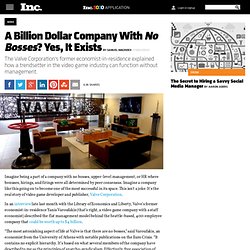
Imagine a company like this going on to become one of the most successful in its space. This isn't a joke: It's the real story of video game developer and publisher, Valve Corporation. In an interview late last month with the Library of Economics and Liberty, Valve’s former economist-in-residence Yanis Varoufakis (that’s right, a video game company with a staff economist) described the flat management model behind the Seattle-based, 400-employee company that could be worth up to $4 billion. “The most astonishing aspect of life at Valve is that there are no bosses,” said Varoufakis, an economist from the University of Athens with notable publications on the Euro Crisis. Tysiąc złotych dla każdego? Zajmie się tym UE. Michał Wybieralski, PAP 09.09.2013 , aktualizacja: 09.09.2013 17:47 Horyzont 2020 już wystartował (Fot.

Jacek Babiel / Agencja Gazeta) Rafał Szumny: 500 złotych dla każdego Polaka bez warunków – to jest możliwe [POSŁUCHAJ] Bezwarunkowy dochód podstawowy to pomysł, aby każdy obywatel otrzymywał wynagrodzenie niezwiązane ze jego pracą.
![Rafał Szumny: 500 złotych dla każdego Polaka bez warunków – to jest możliwe [POSŁUCHAJ]](http://cdn.pearltrees.com/s/pic/th/szumny-otych-polaka-warunkow-70011107)
Dodatkowe pieniądze miałby dostawać każdy obywatel od 18 roku życia. Grupa obywateli Unii Europejskiej stara się obecnie, aby przeprowadzić referendum ogólnoeuropejskie w sprawie wprowadzenia tego rozwiązania. Idea może kojarzyć się z czasami PRL-u i powiedzeniem “czy się stoi, czy się leży”. Zdaniem Krzysztof Lewandowskiego ten projekt nie jest utopią, a społeczeństwu korzystanie z dobrobytu należy się w coraz większym stopniu. - Żyjemy kilkadzesiąt lat po wojnie. America Needs To See Past The Myth Of The 'Free Market' One of the most deceptive ideas continuously sounded by the Right (and its fathomless think tanks and media outlets) is that the “free market” is natural and inevitable, existing outside and beyond government.
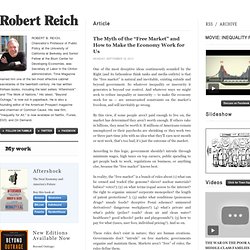
So whatever inequality or insecurity it generates is beyond our control. And whatever ways we might seek to reduce inequality or insecurity — to make the economy work for us — are unwarranted constraints on the market’s freedom, and will inevitably go wrong. By this view, if some people aren’t paid enough to live on, the market has determined they aren’t worth enough. If others rake in billions, they must be worth it. If millions of Americans remain unemployed or their paychecks are shrinking or they work two or three part-time jobs with no idea what they’ll earn next month or next week, that’s too bad; it’s just the outcome of the market. TakeTask.pl » TakeTask. The Past, Present & Future of Work in the Peer Economy. I hear it a lot: "Sharing isn't new.
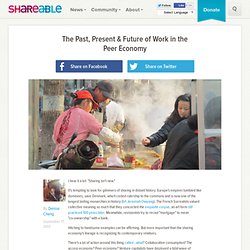
" It's tempting to look for glimmers of sharing in distant history. Europe's empires tumbled like dominoes, save Denmark, which ceded rulership to the commons and is now one of the longest lasting monarchies in history (h/t Jeremiah Owyang). The French Surrealists valued collective meaning so much that they concocted the exquisite corpse, an art form still practiced 100 years later. Meanwhile, revisionists try to recast "mortgage" to mean "co-ownership" with a bank.
Hitching to handsome examples can be affirming. There's a lot of action around this thing called…what? Rafał Szumny: 500 złotych dla każdego Polaka bez warunków – to jest możliwe [POSŁUCHAJ] Bezwarunkowy Dochód Podstawowy - Polska Inicjatywa Obywatelska na rzecz wprowadzenia Bezwarunkowego Dochodu Podstawowego (BDP) Money is Not Needed with Energy Abundance. In order to understand the very basis of money, it is best to contemplate how it developed in the first place.
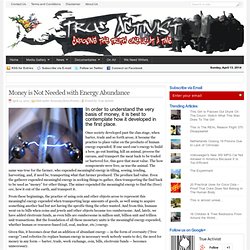
Once society developed past the clan stage, when barter, trade and so forth arose, it became the practice to place value on the products of human energy expended. If one used one’s energy to build a bow, go out hunting, kill an animal, process the carcass, and transport the meat back to be traded or bartered for, this gave that meat value. Money is Not Needed with Energy Abundance. Największe mity polskiej gospodarki - Biznes i prawo gospodarcze - GazetaPrawna.pl - wiadomości, notowania, kursy, praca, emerytury, podatki. Oxford University study suggests world poverty is rapidly shrinking. Poverty levels in Nepal, Rwanda and Bangladesh have dropped Report predicts some of the poorest countries in the world could see acute poverty eradicated within 20 years By Daily Mail Reporter Published: 17:47 GMT, 17 March 2013 | Updated: 08:26 GMT, 18 March 2013 World poverty is shrinking and developing countries are becoming less poor according to a new study by Oxford University.
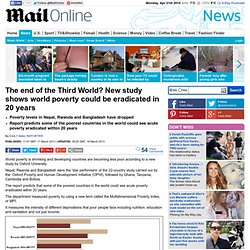
Nepal, Rwanda and Bangladesh were the 'star performers' of the 22-country study carried out by the Oxford Poverty and Human Development Initiative (OPHI), followed by Ghana, Tanzania, Cambodia and Bolivia. The report predicts that some of the poorest countries in the world could see acute poverty eradicated within 20 years.
The department measured poverty by using a new term called the Multidimensional Poverty Index, or MPI. It measures the intensity of different deprivations that poor people face including nutrition, education and sanitation and not just income. Australia to Abandon the U.S. Dollar. Spółdzielnia, która chce zmienić świat. Morning Star bez menadżerów. Ten Responses to the Technological Unemployment Problem. On the internet and in the media there has been growing discussion of technological unemployment.
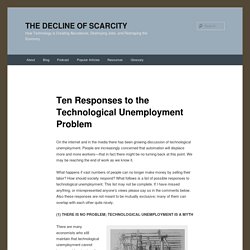
Forget Peak Oil, We're At Peak Everything. Peak oil is the concept that new discoveries of commercially exploitable oil resources do not keep pace with growing demand.

By extrapolating the data, you can estimate when we will run out of it for all practical purposes. There are a lot of disagreements about whether we have reached peak oil or when the downhill slope will hit a point that brings a significant percentage of our vehicles to a grinding halt, but the concept has made scientists and policy makers ask the question: What other critical resources may be peaking? Asia Pulp & Paper Company, one of the world’s largest, announced last month that it will no longer use wood from natural forests for any of its $4 billion per year worth of products.
Why? Because APP’s customers realized we are running out of natural forests from which to harvest lumber and have demanded suppliers to develop sustainable sources. Another essential commodity that may soon hit its peak is food. Komisja Europejska: Piractwo nie szkodzi sprzedaży muzyki. Antypiraci oburzeni! The Tunnel People That Live Under The Streets Of America. Did you know that there are thousands upon thousands of homeless people that are living underground beneath the streets of major U.S. cities?
It is happening in Las Vegas, it is happening in New York City and it is even happening in Kansas City. As the economy crumbles, poverty in the United States is absolutely exploding and so is homelessness. In addition to the thousands of “tunnel people” living under the streets of America, there are also thousands that are living in tent cities, there are tens of thousands that are living in their vehicles and there are more than a million public school children that do not have a home to go back to at night. The federal government tells us that the recession “is over” and that “things are getting better”, and yet poverty and homelessness in this country continue to rise with no end in sight.
Global Rich List. Marinaleda: komunistyczny raj w Europie? - Wakacje w Świecie - najciekawsze miejsca na wakacyjną podróż - Dziennik.pl. World’s 100 richest earned enough in 2012 to end global poverty 4 times over. PolskaBieda.com.